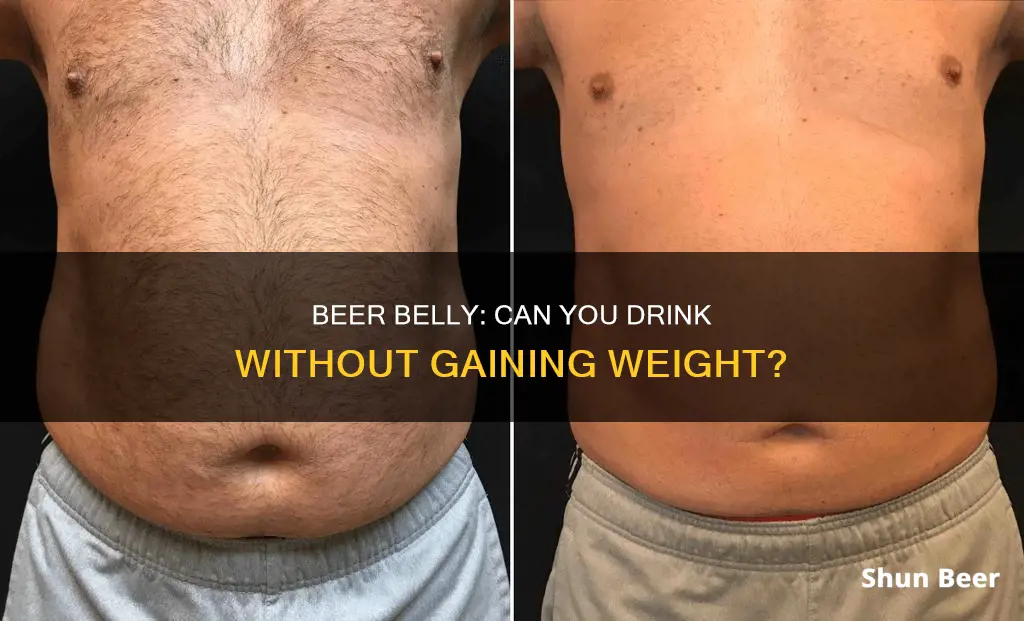
Whether you're a beer lover or just an occasional drinker, you might have wondered about the impact of beer on your belly. The infamous beer belly is often associated with beer drinkers, but is it really the beer that's to blame? In this paragraph, we will explore the relationship between beer consumption and belly fat, and answer the question: does a beer belly go away when you stop drinking?
What You'll Learn

Alcohol calories and weight gain
Alcohol is high in calories but lacks nutrients. A typical beer has 150 calories, and if you have several in one sitting, you can end up with a serious calorie overload. A Pina Colada has 500 calories in a 7-ounce (205 ml) glass, and a Long Island Iced Tea has up to 780 calories in a 7-ounce (205 ml) serving.
Alcohol is broken down into acetate, which the body prioritises burning over fat or sugar. This means that when you drink alcohol, you are not burning fat. Alcohol also inhibits "lipid oxidation", making it harder for your body to burn existing fat.
In addition, alcohol may affect the hormones that control appetite, hunger, and stress. It can reduce your blood sugar level, which may increase hunger. Some evidence suggests that people may seek high-carb foods to satisfy their cravings if their blood sugar dips.
Heavy drinking is defined as more than three drinks per day or seven drinks per week for women, and more than four drinks per day or 14 drinks per week for men. If you are drinking this much, it is likely to lead to weight gain over time.
However, light-to-moderate alcohol consumption does not cause weight gain. If you are trying to lose weight, you do not need to cut out alcohol entirely. Instead, try to consume it more mindfully. Watch the number and type of drinks you choose, and pay attention to how drinking affects your eating habits.
- Drink in moderation. This means no more than one drink per day for women and no more than two drinks per day for men.
- Eat before you drink. This will help your stomach absorb the alcohol more slowly and help you make better food choices.
- Limit mixed drinks. Opt for a seltzer or splash of juice instead of liqueur, juice, and syrup.
- Opt for low-calorie drinks. Light beer has about 100 calories per 12 ounces, compared to 150 calories in regular beer.
- Set limits for yourself before you start drinking.
- Sip slowly and opt for water after you finish an alcoholic beverage.
Old Beer in Fridge: Still Drinkable?
You may want to see also

Alcohol's impact on fat burning
Alcohol can have a significant impact on fat burning and, by extension, weight loss. Firstly, it is often referred to as "'empty' calories", providing the body with calories but very few nutrients. Alcoholic drinks are calorie-dense, and a night out with several drinks can result in consuming a few hundred extra calories.
When alcohol is consumed, the body prioritises burning it as a fuel source before anything else, including glucose from carbohydrates or lipids from fats. This means that excess glucose and lipids are stored as fat. The liver, which plays a crucial role in metabolising fats, carbohydrates, and proteins, can be damaged by excessive alcohol consumption, leading to alcoholic fatty liver. This condition further affects the body's ability to metabolise and store carbohydrates and fats efficiently.
Alcohol also affects judgement and lowers inhibitions, making it difficult to resist the urge to eat, especially when intoxicated. Additionally, alcohol consumption can trigger hunger signals in the brain, leading to an increased urge to eat more food. It also affects sex hormones, such as testosterone, which plays a role in metabolic processes like fat-burning capabilities.
Furthermore, alcohol negatively impacts sleep quality, leading to increased periods of wakefulness during sleep cycles. Sleep deprivation can disrupt the balance of hormones related to hunger, satiety, and energy storage. Alcohol consumption also inhibits proper digestive function, causing stress on the stomach and intestines, resulting in decreased digestive secretions and reduced movement of food through the tract. This impaired digestion and absorption can affect the metabolism of organs involved in weight management.
While alcohol consumption may not need to be eliminated entirely, reducing the amount and opting for lower-calorie alternatives can be beneficial for weight loss.
Lip Fillers and Beer: What's Safe to Drink?
You may want to see also

The role of genetics in fat storage
The amount and location of fat stored in the body is influenced by both genetic and environmental factors. While the amount of fat stored is determined by the balance of calories consumed and burned, genetics play a significant role in determining where this fat is stored. This is particularly true for women, who tend to store fat in their arms, thighs, buttocks, and bellies due to higher levels of subcutaneous fat. Men, on the other hand, have less subcutaneous fat and thus store more fat in their bellies.
Genetic factors also influence the type of fat that is stored. Subcutaneous fat, found under the skin, is considered less harmful than visceral fat, which is found deep within the abdominal cavity and has been linked to various health issues such as type 2 diabetes, high blood pressure, and cardiovascular disease.
Several genes have been identified that play a role in fat distribution, including TBX15, HOXC13, RSPO3, and CPEB4. These genes exhibit sexual dimorphism, meaning they have stronger effects on fat distribution in women than in men. Additionally, developmental genes such as TBX15, HOXC13, GPC4, and NR2F1 have been found to have higher expression in visceral adipose tissue, while genes such as HOXA10, HOXC9, TWIST1, and TBX15 are more highly expressed in subcutaneous fat.
In summary, the role of genetics in fat storage is significant, particularly when considering the health implications of visceral fat accumulation. While genetic factors influence fat distribution, environmental factors such as diet and physical activity also play a crucial role in determining overall fat levels in the body.
Beer and Alcoholism: Is There a Link?
You may want to see also

Health risks of excess abdominal fat
While the term "beer belly" is often used in a lighthearted manner, excess abdominal fat is linked to a variety of serious health problems. Also known as visceral fat, abdominal fat is found deep within the abdominal cavity, surrounding internal organs. This is in contrast to subcutaneous fat, which lies just under the skin and can be grasped with your hand.
Abdominal fat is of particular concern because it is a key player in a variety of health problems. It is associated with high levels of LDL ("bad") cholesterol and low levels of HDL ("good") cholesterol. It impairs the body's responsiveness to insulin, raising blood sugar and insulin levels. This can lead to insulin resistance, which is a major cause of Type 2 diabetes.
Excess abdominal fat contributes to other major causes of death and disability, including heart attacks, strokes, high blood pressure, cancer, diabetes, osteoarthritis, fatty liver, and depression. It has also been linked to an increased risk of sudden death.
The good news is that you can control your abdominal fat through a healthy lifestyle. This includes a proper diet and regular exercise. Any intervention that leads to sustained weight loss will reduce belly fat, but recent research has shown that regular exercise lowers belly fat proportionally more than it lowers overall weight.
To decrease abdominal fat, it is recommended to avoid foods high in simple sugars or saturated fats. The Mediterranean Diet, which incorporates lots of olive oil, can be beneficial. There is some evidence that vegetable oil may cause fat to collect in the abdominal region, while olive oil consumption may promote fat accumulation in less harmful areas of the body.
Drinking Beer in Venice: What's Allowed in Public?
You may want to see also

Strategies for reducing belly fat
While it is impossible to target belly fat specifically, losing weight overall will help shrink your waistline and reduce the dangerous layer of visceral fat. Here are some strategies for reducing belly fat:
Reduce Your Calorie Intake
Any kind of calories—whether from alcohol, sugary beverages, oversized portions of food, or fatty foods—can increase belly fat. When you take in more calories than you burn, the excess calories are stored as fat. To lose 1 pound of fat, you need to burn 3,500 more calories than you eat. Reducing your calorie intake by 500 calories per day will help you lose 1 pound of fat in a week.
Eat More Protein
High-protein foods increase the release of the fullness hormone peptide YY, which decreases appetite and promotes fullness. Protein also raises your metabolic rate and helps you retain muscle mass during weight loss. Aim to include a good protein source, such as fish, lean meat, and beans, at every meal.
Eat Plenty of Soluble Fibre
Soluble fibre absorbs water and forms a gel that helps slow down food as it passes through your digestive system. It promotes weight loss by helping you feel full, so you naturally eat less. Excellent sources of soluble fibre include fruits, vegetables, and legumes.
Avoid Processed Foods
The ingredients in packaged goods and snack foods are often heavy on trans fats, added sugar, and added salt or sodium—three things that make it difficult to lose weight. Instead, opt for high-fibre or high-protein choices, such as vegetables, beans, and healthy meats.
Exercise Regularly
Doing sit-ups or other abdominal exercises will strengthen your core muscles but won't eliminate belly fat. To lose belly fat, you need to lose weight through aerobic exercises like running, swimming, cycling, or tennis. Any kind of exercise will help you keep the weight off more effectively than dieting alone. Adding strength training to aerobic exercise helps build lean muscle mass, which causes you to burn more calories throughout the day.
Manage Your Stress
Stress can trigger the adrenal glands to produce cortisol, also known as the stress hormone. High cortisol levels increase appetite and drive abdominal fat storage. To help reduce belly fat, engage in activities that relieve stress, such as yoga or meditation.
Get Enough Sleep
Studies show that not getting enough sleep may be linked to a higher risk of obesity and increased belly fat. Aim for at least 7 hours of quality sleep per night.
The Most Popular Beer Choices Among Mexicans
You may want to see also
Frequently asked questions
Yes, but it will take a combination of diet and exercise.
Excess calories, whether from alcohol, sugary beverages, or oversized portions of food, can increase belly fat. Alcohol also stimulates your appetite, often for high-calorie foods, and interferes with your body's ability to burn fat.
Excess weight around the midsection is linked with an increased risk of health problems, including type 2 diabetes, high blood pressure, cardiovascular disease, and fatty liver disease.
The time frame depends on various factors, including the amount of weight you want to lose and your commitment to exercise, diet, and lifestyle changes. On average, a safe and reasonable weight loss plan is losing 1-2 pounds per week.
Some tips include cutting back on beer consumption, eating more fruits and vegetables, increasing physical activity, and making healthy food swaps such as drinking water instead of soda.







